

William Alexander Morgan wikipedia. Un article de Wikipédia, l'encyclopédie libre.
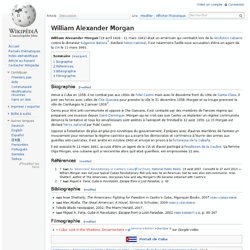
William Alexander Morgan (19 avril 1928 - 11 mars 1961) était un américain qui combattit lors de la révolution cubaine contre le dictateur Fulgencio Batista [ 1 ] . Déclaré héros national , il est néanmoins fusillé sous accusation d'être un agent de la CIA le 11 mars 1961. Biographie [ modifier ] Arrivé à Cuba en 1958, il ne combat pas aux côtés de Fidel Castro mais avec le deuxième front du côté de Santa-Clara . Il joint ses forces avec celles de Che Guevara pour prendre la ville le 31 décembre 1958.
Connu pour être anti-communiste et opposé à Che Guevara, il est contacté par des membres de l'ancien régime qui préparent une invasion depuis Saint-Domingue . Opposé à l'orientation de plus en plus pro-soviétique du gouvernement, il prépare avec d'autres membres de l'armée un mouvement pour renverser le régime castriste qui a écarté les démocrates et commence à fournir des armes aux guérillas anti-castristes. Références [ modifier ] William Morgan. Fidel Castro & William Morgan. This wife. After 21 years in prison, the widowed Olga Morgan moved to Toledo and remarried.
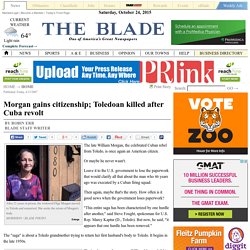
She seeks the return of Morgan's body. MORRISON / BLADE PHOTO Enlarge The late William Morgan, the celebrated Cuban rebel from Toledo, is once again an American citizen. Or maybe he never wasn't. Leave it to the U.S. government to lose the paperwork that would clarify all that about the man who 46 years ago was executed by a Cuban firing squad. Then again, maybe that's the story. "This entire saga has been characterized by one hurdle after another," said Steve Fought, spokesman for U.S. The "saga" is about a Toledo grandmother trying to return her first husband's body to Toledo. Toledoan William Morgan met and married Olga Rodriguez in Cuba while fighting alongside Fidel Castro's rebels.HO Enlarge That's when a restless, young William Morgan left his Toledo home and made his way to Cuba.
He rose through the military ranks and he met his wife, Olga Rodriguez, in the mountains during the fighting. Film The Yankee Comandante "El américano" Après Steven Soderbergh et son film en deux parties sur le Che, une autre figure de Hollywood, l’acteur, réalisateur et producteur George Clooney, s’apprête à nous livrer sa vision de la révolution cubaine.
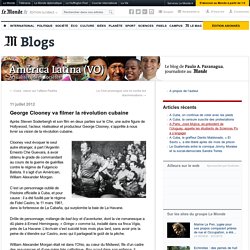
Inspiré de l'article de David Grann. For a moment, he was obscured by the Havana night.
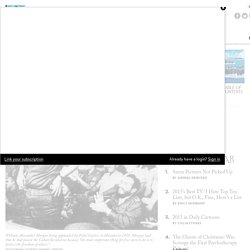
It was as if he were invisible, as he had been before coming to Cuba, in the midst of revolution. Then a burst of floodlights illuminated him: William Alexander Morgan, the great Yankee comandante. He was standing, with his back against a bullet-pocked wall, in an empty moat surrounding La Cabaña—an eighteenth-century stone fortress, on a cliff overlooking Havana Harbor, that had been converted into a prison. Flecks of blood were drying on the patch of ground where Morgan’s friend had been shot, moments earlier. Morgan, who was thirty-two, blinked into the lights. The gunmen gazed at the man they had been ordered to kill. It was March 11, 1961, two years after Morgan had helped to overthrow the dictator Fulgencio Batista, bringing Castro to power.
After the revolution, Morgan’s role in Cuba aroused even greater fascination, as the island became enmeshed in the larger battle of the Cold War. William Morgan's saga. With hands resting on their guns, Ernesto ''Che'' Guevara and William Morgan -- two rebel leaders -- glared at each other from across a desolate field in the central mountains of Cuba.
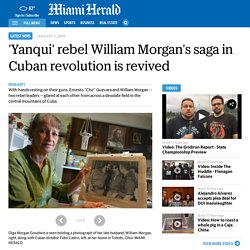
For a tense moment on that fall day 50 years ago, each waited for the other to make a move -- the Cuban revolution on the brink. They exchanged harsh words but in the end put down their weapons, agreeing to return to fighting their common enemy, the Fulgencio Batista regime. Both would lead their own units in the final weeks of the revolution. Both captured major cities. Both played pivotal roles in the conflict.
But while Guevara has been long remembered, Morgan has been largely forgotten -- an ex-paratrooper buried in an obscure grave in Havana's largest cemetery. Former rebels who fought with Morgan argue that he has never been recognized for his role in a revolution that changed Cuba. ''He was a soldier,'' said Enrique Encinosa, a Miami radio host who penned six books on Cuban history. Eloy Gutierrez Menoyo le 3ème commandante.